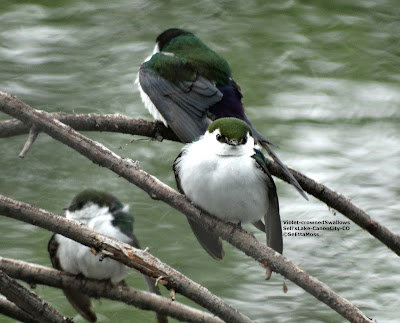
What makes Sabal Palm Audubon Sanctuary so valuable is the habitat including the sabal palm forest that was extensive along the Rio Grande Valley until man cut them down for agriculture and other development. The Sanctuary has several miles of interconnected trails, including boardwalks like the one pictured here. Many of these trails are fairly level so accessible to those with ambulation problems plus they have a wheelchair accessible deck.

According to the
Sabal Palm Audubon Sanctuary website, "The Center is home to many native species of plants and animals that reach the northernmost limit of their Mexican range here and do not occur elsewhere in the U.S. Cradled in a bend of the Rio Grande along the U.S./Mexico border, the Sabal Palm Audubon Center harbors one of the most beautiful and critical ecosystems of South Texas and Northern Mexico. Sabal Palms once grew profusely along the edge of the Rio Grande in small stands or groves extending about 80 miles upstream from the Gulf of Mexico. Today, only a small portion of that forest remains, protected on 557 acres of this Audubon sanctuary." SeEtta

 What makes Sabal Palm Audubon Sanctuary so valuable is the habitat including the sabal palm forest that was extensive along the Rio Grande Valley until man cut them down for agriculture and other development. The Sanctuary has several miles of interconnected trails, including boardwalks like the one pictured here. Many of these trails are fairly level so accessible to those with ambulation problems plus they have a wheelchair accessible deck.
What makes Sabal Palm Audubon Sanctuary so valuable is the habitat including the sabal palm forest that was extensive along the Rio Grande Valley until man cut them down for agriculture and other development. The Sanctuary has several miles of interconnected trails, including boardwalks like the one pictured here. Many of these trails are fairly level so accessible to those with ambulation problems plus they have a wheelchair accessible deck. According to the Sabal Palm Audubon Sanctuary website, "The Center is home to many native species of plants and animals that reach the northernmost limit of their Mexican range here and do not occur elsewhere in the U.S. Cradled in a bend of the Rio Grande along the U.S./Mexico border, the Sabal Palm Audubon Center harbors one of the most beautiful and critical ecosystems of South Texas and Northern Mexico. Sabal Palms once grew profusely along the edge of the Rio Grande in small stands or groves extending about 80 miles upstream from the Gulf of Mexico. Today, only a small portion of that forest remains, protected on 557 acres of this Audubon sanctuary." SeEtta
According to the Sabal Palm Audubon Sanctuary website, "The Center is home to many native species of plants and animals that reach the northernmost limit of their Mexican range here and do not occur elsewhere in the U.S. Cradled in a bend of the Rio Grande along the U.S./Mexico border, the Sabal Palm Audubon Center harbors one of the most beautiful and critical ecosystems of South Texas and Northern Mexico. Sabal Palms once grew profusely along the edge of the Rio Grande in small stands or groves extending about 80 miles upstream from the Gulf of Mexico. Today, only a small portion of that forest remains, protected on 557 acres of this Audubon sanctuary." SeEtta 


Comments